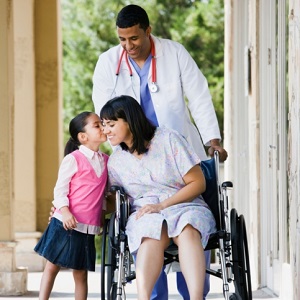 Traumatic brain injury (TBI) is defined as an “alteration in the function of the brain or other evidence of brain pathology caused by an external force,” according to the Brain Association of America in 2011. Defining brain injury has not been consistent in the medical research because of the complexity of the brain physiology. Improvements in technology has helped improve understanding of the brain but there still remain significant unknowns. Science journalist Carl Zimmer describes the brain as:
Traumatic brain injury (TBI) is defined as an “alteration in the function of the brain or other evidence of brain pathology caused by an external force,” according to the Brain Association of America in 2011. Defining brain injury has not been consistent in the medical research because of the complexity of the brain physiology. Improvements in technology has helped improve understanding of the brain but there still remain significant unknowns. Science journalist Carl Zimmer describes the brain as:
- an intricate network of billions of neurons
- a collaboration of neurons in constant communication
- a chemical labyrinth that senses the world inside and outside
- an organ that produces love and sorrow,
- keeps our hearts beating,
- keeps our lungs breathing,
- composes our thoughts,
- and constructs our consciousness.
Nobel Laureate Eric Kandel described the human brain as “the most complex organ in the universe.” Damage to this vital organ can cause significant limitations to a person’s ability to process the activities of daily living and function both mentally and physically. Traumatic brain injury (TBI) happens suddenly but can leave a lifetime of permanent disabilities.
Medical research has not successfully discovered curative interventions to repair the brain to pre-injured status. The lack of proven effective treatments for restoring impairments means focus for interventions is on treating the symptoms associated with the multiply traumatic changes associated with brain injuries. This void in medical treatments indicates the need for psychosocial support for the TBI survivor, the spouse/partner, and family members. The main focus of therapy is 1) to help facilitate adaptation to a changed life, 2) to facilitate a quality of living with limited abilities, and 3) to create a collaborative new reality of well-being.
Impact on Family Dynamics
Traumatic brain injury does not happen in a vacuum. It is a chronic health issue that affects the entire family. Murray Bowen’s family systems theory explains how traumatic changes to one member of the family cascades throughout the family system. In nature, this is like throwing a pebble into a pond and observing how the water ripples throw out the pond. When one family member suffers traumatic changes, the stress is felt throughout the family system. The established patterns and roles are altered, changing the entire family dynamics. The heighten changes are a major stressor and cause a negative shift in the family’s well-being.
Family members are often described as the “neglected victims” of TBI. Many marriages end in divorce after brain injuries. The loss of an intact family causes further losses for the survivor. The difficulty learning to understand and cope with the monumental changes post injury are some of the reasons there is a need to conduct therapy from a family perspective. The therapeutic process needs to address loss, grief, and adaptation to creating a new life. Maintaining and developing socializations skills as well as a strong support system of family, friends, and a spiritual leader are helpful to the healing process.
‘An Invisible Disease’
There are many challenges to traumatic brain injury that sets it apart from other chronic illnesses. First, it has been described as an “invisible disease” and a “silent epidemic.” It is estimated that 1.7 million people are diagnosed each year. However, these numbers are considered an underestimate because of the lack of visible damages and the subtleties of impairments. The extent of cognitive deficits may not be apparent until much later. The insidious nature of the impairments means family members and professionals may overestimate the abilities of the survivor.
However, trauma to the brain frequently causes pervasive cognitive dysfunction and variety of personality changes, such as impulsivity, anger, fatigue, irritability, unpredictability, and depression. Lack of critical thinking, impaired social perceptiveness, and lack of empathy are also considered hindrances for the lack of awareness the survivor has about his or her own impairments and the decrease in motivation to adapt to a new reality. These problematic issues have a negative impact on martial/couple relationship, family dynamics, and relationships in general. Yet, the research indicates that a meaningful and supportive relationship can contribute to the TBI survivor’s healing from the psychological trauma.
Including Partners and Family Members
The recommended plan of care for the injured person includes psychosocial support for the caregiver, spouse, and family members. The North American Brain Injury Society (NABIS) reports a need for more effective incorporation of family support based on the last decades of research. Marriage and family research has shown that maintaining strong and supportive relationships are integral to helping the survivor cope with challenging changes, as well as for the spouse and family members to adapt to living with a new person.
References:
- Bowen, M. (1985). Family therapy in clinical practice. Northvale, NJ: Jason Aronson.
- Brain Injury Association of America. (nd).http://www.biausa.org/index.htm
- Brey, R. (2006). The silent epidemic: Traumatic brain injury’s massive impact on suffers and society. Neurology Now, 5.
- National Institute of Mental Health (NIMH). (nd). http://www.nimh.nih.gov/health/topics/anxiety-disorders/index.shtml
- National Institutes of Health. (2008). Traumatic brain injury: A family finds its way. National Institutes of Health: Medline Plus, 3(4), 2-7. Retrieved from NIH Medline Plus: http://www.nlm.nih.gov/medlineplus/magazine/issues/fall08/toc.html
- Nichols, P., & Schwartz, R. (2004). Bowen family systems therapy. In Family therapy concepts and methods (pp. 119-146). Allyn & Bacon.
- North America Brain Injury Society, NABIS. (2008). Barriers and recommendations: Addressing the challenge of brain injury in America. Washington, D.C.
- Wood, R., Liossi, C., & Wood, L. (2005). The impact of neurobehavioural sequelae on personal relationships: Preliminary findings. Brain Injury, 19(10), 845-851.
- Zimmerman, C. (2004). Soul made flesh: The discovery of the brain and how it changed the world. New York: Free Press.

The preceding article was solely written by the author named above. Any views and opinions expressed are not necessarily shared by GoodTherapy.org. Questions or concerns about the preceding article can be directed to the author or posted as a comment below.


 Why It's Time to Bring Your Invisible Disability Out into the Open
Why It's Time to Bring Your Invisible Disability Out into the Open Concussions, Creativity, and Cunning: The Surprising Link
Concussions, Creativity, and Cunning: The Surprising Link 'Me Time' When Coping with Chronic Illness, Part I
'Me Time' When Coping with Chronic Illness, Part I

Please fill out all required fields to submit your message.
Invalid Email Address.
Please confirm that you are human.
Leave a Comment
By commenting you acknowledge acceptance of GoodTherapy.org's Terms and Conditions of Use.